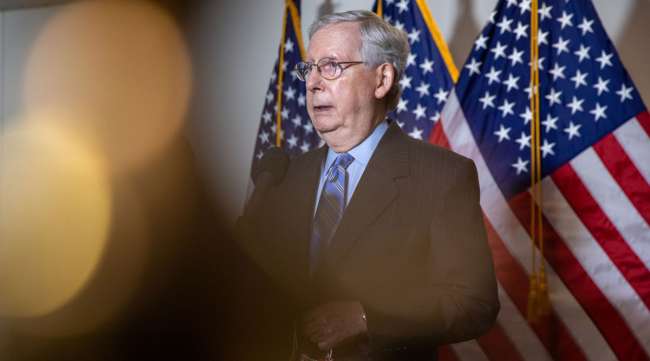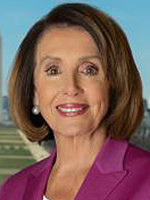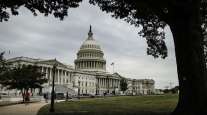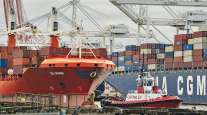Senior Reporter
‘Kumbaya Moment’ Unlikely in Next COVID-19 Bill, McConnell Says

[Ensure you have all the info you need in these unprecedented times. Subscribe now.]
Partisan disagreements about the degree of assistance to provide various groups and industries have delayed a massive COVID-19 relief package from reaching the president’s desk prior to the congressional August recess.
Ultimately, the next round of emergency aid in response to the pandemic will not be celebrated as a positive moment of bipartisanship on Capitol Hill, the leader of the U.S. Senate said recently.
“It’s not going to produce a ‘kumbaya moment’ like we had in March or April, where everybody voted ‘aye.’ But, the American people, in the end, need help,” Majority Leader Mitch McConnell (R-Ky.) said Aug. 4. “And, wherever this thing settles between the president of the United States and his team — they’d have to sign it into law — and the Democrats — not an insignificant minority in the Senate and majority in the House — is something I’m prepared to support, even if I have some problems with certain parts of it.”
The next day, the Republican leader claimed the Democrats’ position during the negotiations has been for millions of laid-off individuals to receive nothing “unless they get a higher salary than the people who are still working.”
“Republicans want to keep providing some supplemental federal unemployment,” McConnell added. “We just don’t think it is remotely fair for the federal government to tax essential workers who’ve kept working every day so Uncle Sam can pay their neighbors a higher salary to stay home.”
Senate managers have suggested a delay to the August recess is possible. McConnell’s caucus recently proposed a $1 trillion measure that would, among other things, provide the Federal Aviation Administration’s Airport Improvement Program $10 billion.
During negotiations with top White House officials, Democrats, led by House Speaker Nancy Pelosi, are pushing for unemployment benefits, as well as myriad funding for frontline and essential workers. A House-passed package of about $3 trillion includes $15 billion for highway programs.

Pelosi
“We’ve got to end the virus, so we can open our schools and open our economy. We’ve got to help state and local governments so that they can meet the needs of people,” the speaker said recently. “And we have to put money in the pockets of the American people so that they can stimulate the economy, spend the money, inject demand and the rest.”
Senate Minority Leader Chuck Schumer (D-N.Y.) said, “To have a skinny, little bill, to say we’ll just pick one or two things and do those and walk away from all the other responsibilities, when we are in a deep recession, when we are in a major health crisis, is not living up to our obligations to the American people. And so, we’re going to keep sitting and working as the speaker said. And we are not walking away.”
President Donald Trump, meanwhile, has remained critical of Democrats, primarily mayors and governors. “We’re talking with the Democrats,” he said. “They seem to be much more interested in solving the problems of some of the Democrat-run states and cities that have suffered greatly through bad management.”

Sullivan
Infrastructure funding advocates, such as freight and construction stakeholders, continue to push for their priorities to be included in the economic aid legislation. American Trucking Associations Executive Vice President of Advocacy Bill Sullivan said his group is calling on Congress to temporarily suspend a 12% excise tax on new trucks as part of the next phase of stimulus. He also pointed to the pandemic’s challenges across the business landscape.
“We believe Congress should pass a robust relief bill to keep our economy moving,” Sullivan told Transport Topics on Aug. 5. “Previous relief packages have worked by injecting liquidity into the markets, both for consumers and businesses, and that is a good thing. We also believe more targeted relief, like the suspension of the federal excise tax on truck purchases, will help stimulate the economy.
RELATED: Meadows Says Democrats Rebuff White House on Stopgap Jobless Aid
“In addition, we need to make sure that this virus does not unleash an epidemic of frivolous lawsuits, so it is important that Congress enact protections for companies against unscrupulous trial attorneys who would use this crisis as an excuse to attack well-meaning companies.”
In a letter to congressional leaders, groups such as the American Association of State Highway and Transportation Officials and the American Road and Transportation Builders Association placed an emphasis on receiving federal assistance soon.
“It will prevent further disruptions to planned transportation projects and allow state [departments of transportation] employees and transportation construction workers essential to planning and delivering these projects to remain on the job,” they wrote last month. “The funding will also preserve the core capabilities of state DOTs that are critical to implement a robust, bipartisan surface transportation reauthorization bill, which can serve as a platform for national economic recovery and growth.”
Want more news? Listen to today's daily briefing:
Subscribe: Apple Podcasts | Spotify | Amazon Alexa | Google Assistant | More




